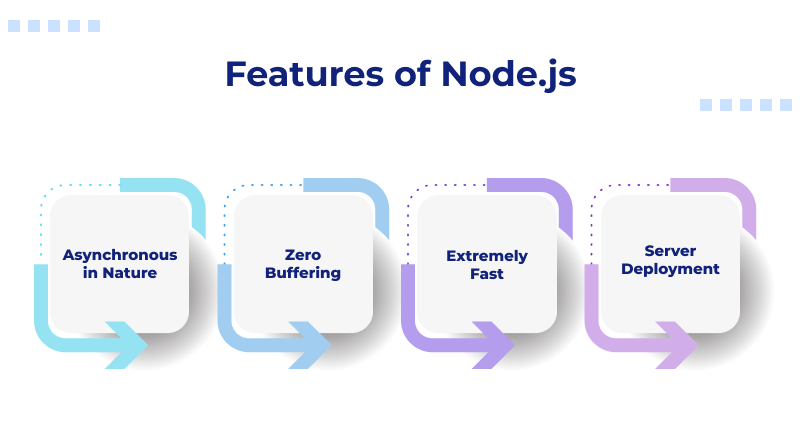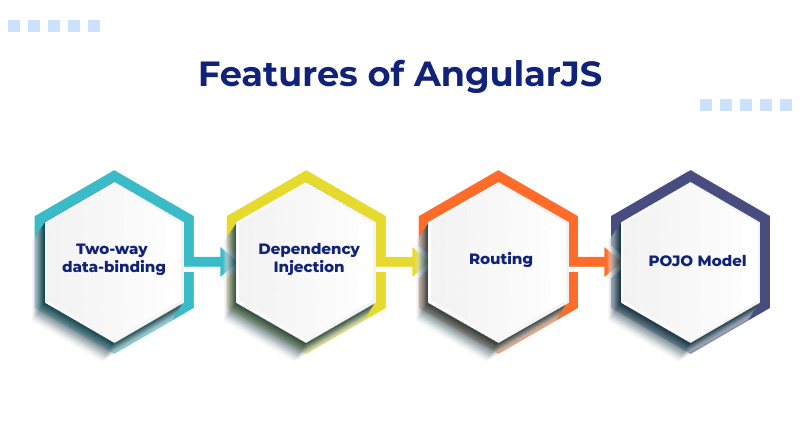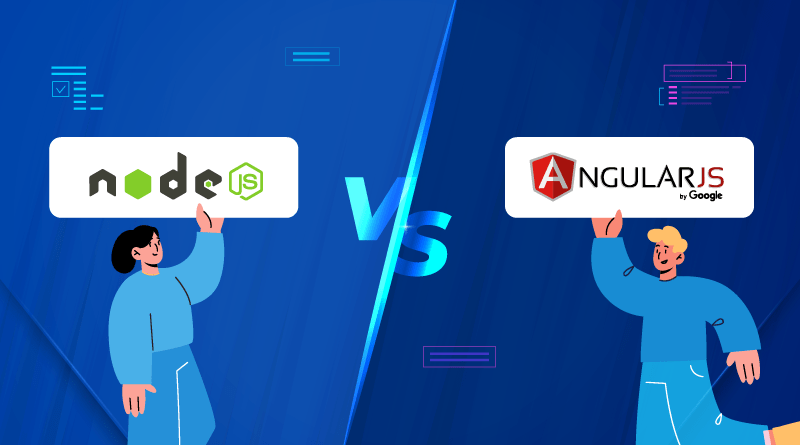Javascript has evolved into the most popular programming language used for developing web-based applications!
It’s ruling the web development world, from the internet browser to developing server-side applications to creating interactive websites, Javascript platform is being used everywhere.
Besides, there are different Javascript frameworks, like Node.js, AngularJS, React.js, Express.js and so on.
Are you familiar with these or might have heard about the same? In fact, these Javascript frameworks are becoming the first choice among developer communities worldwide. Infact, you can run nodejs website with node.js hosting.
Do you think NodeJS is the right fit for your next web project, or do you think going with AngularJS can be beneficial? Now, this is a point of discussion, right?
Well, here in this blog we’ll clear both the concepts. Let’s walk through the two strong frameworks, Node.js Vs AngularJS.
Table Of Content
What is Node.js?
Node.js is basically a single-threaded, cross-platform runtime environment that is built on Google Chrome’s V8 javascript engine. That is, among the two (AngularJS and Node), Node.js is easier to learn with the best practices applied! It’s an open-source framework used to build the backend of most web applications.
Node.js gives web developers a platform to write, test and deploy the Javascript code outside the web browser. Most importantly it’s a cross-platform environment. To put it in plain words, it can be built and deployed on Linux, Windows and MacOS.
The non-blocking asynchronous architecture of Node.js is growing in popularity immensely, adding the difference between Node and Angular. It helps node.js developers to successfully create several web projects quickly and efficiently. In fact, the big giants in the market like LinkedIn, PayPal and more use Node.js for web projects!
Moving further, we’ll now explore why you should go for Node.js.
Why Should You Use Node.js?
And this will clear your question of why you should use Node.js for your web project, between Node.JS and AngularJS.
– Scalability
Scalability at its core! And that’s one of the best benefits of Node.js for those planning to grow shortly. The scalability of Node.js is achieved due to load balancing, and the ability to handle simultaneous connections at the same time.
– Free and Open Source Platform
Node is a free and open-source platform, creating another major difference between Angular and NodeJS. You need to install Node.js on your system freely.
– The Speed
Speedy execution of tasks is what we desire for. Node.js is exactly the same. The non-blocking IO thread among NodeJS vs. AngularJS makes the Node execution faster and more efficient.
– Great Community Support
Being a popular and widely used platform, Node.js has a vast community of software developers who try to enhance and contribute to making tweaks to the technology.
– Easy Learning Curve
As we know that Javascript is a popular language among web developers to build the backend of applications. If you are familiar with the basics of Javascript, you can learn Node.js very quickly! You can even start writing code in less time and give a head start to your web project!
Features of Node.js
Now that you have an overview of what Node.js is, let’s get to know the features of Node.js:

- Asynchronous in Nature: All the APIs in the Node.js library are asynchronous, which means they are non-blocking. A Node.js- based server does not wait for an API to return again to data. It always moves to the next API!
- Zero Buffering: In comparison between NodeJS vs. AngularJS , the applications developed in Node.js never buffer any data. Rather, it reduces the processing time!
- Extremely Fast: As Node.js makes use of the V8 runtime environment. This makes the Node.js code run extremely fast.
- Server Deployment: Node.js has a few built-in APIs that lets you create different types of servers like DNS, HTTP, and TCP servers.
What is AngularJS?
In 2010, Google first introduced AngularJS, an open-source Javascript framework for creating single page applications and modifying the static HTML to dynamic HTML.
It’s built on MVC architecture that’s generally used to design internet applications. This framework precedes the basic HTML and offers extensions in the form of directives having the capability to make the website design mobile-friendly and dynamic. It mainly focuses on code quality and testability, and this is why developers mainly prefer it over node.js, including the other different frameworks available.
Why Use AngularJS?
Here we’ve listed down the benefits of AngularJS. This will help you know why you should go for AngularJS?
– Great User Interface
An easy-to-use interface makes even the toughest task easy. AngularJS is well-structured and has an easy-to-use interface. With this, interpreting and manipulating the key components can be handled easily.
– Code Reusability
Code reusability is a notable difference between AngularJS and NodeJS, giving AngularJS a competitive edge over the various JavaScript frameworks available. It lets the developers use the same code that has been already developed previously. Code reusability cuts down costs and saves developers time a lot!
– Client-Side Solution
AngularJS plays a key role on the client-side. Here there’s no need to make the changes in the backend, so it’s the best way to use AngularJS for developing the front-end applications.
– Faster Application Development
The MVC architecture of AngularJS ensures that the application development, testing and maintenance is fast and super-quick!
Features of AngularJS
Anugular.js comes with a set of powerful features listed below:

- Two-way data-binding: It basically synchronizes the data between the Model and the View components.
- Dependency Injection: This is an inbuilt subsystem that makes the entire process of designing and testing web applications smooth and easy.
- Routing: Routing as in networking is the concept of switching views.
- POJO Model: It’s called the Plain Old Javascript Objects. This allows the manipulation of objects through specific Javascript functions. It makes it easy to reuse the code for developers.
NodeJS Vs AngularJS: The Key Differences
Here are the main differences between node js and angular js: Take a look!
| Parameter | Node.js | AngularJS |
| Installation & Deployment | In order to use and deploy the Node.js applications, developers first need to install Node.js on their system as it is a runtime environment. | In the case of AngularJS, developers do not have to download AngularJS to develop or deploy the web project as they can embed the Angular framework directly into the code. |
| Language | Node.js is written in C, C++ and Javascript. | It’s completely written in Javascript. |
| Best Suited For | It’s best suited for small-scale web projects. | Large-scale and interactive web projects |
| Architecture | Based on the MVC architecture, meaning, Model, View, Control architecture. | Based on the Event-Loop architecture |
| Different Frameworks | Node.js has different frameworks like Express.js, Sail.js, Partial.js | AngularJS is a web application framework itself. |
| Application | Used to build server side and client side networking applications | Widely used to build single-page client side applications |
| Development Environment | JavaScript | JavaScript |
| Performance | Known for speed and efficiency | Large-scale applications can experience slow processing |
| Learning Curve | Generally considered easier for beginners | AngularJS has a steeper learning curve, especially for those without a strong understanding of JavaScript |
| Popular Frameworks | Express.js, Nest.js, Koa | React (alternative), Ionic, NativeScript |
And that’s all about the differences between Node.js and AngularJS!
Future of Node.js and AngularJS: Difference between AngularJS and NodeJS
Node.js, being a server-side runtime environment, has a vibrant and increasing community. The primary design is based on events and non-blocking, which come in handy in the development of scalable and real-time applications. While Node.js remains to be updated, other versions are created that offer better performance and more functionalities.
On the other hand, AngularJS has better architecture, new features, and better performance, pointing out the key difference between Node and Angular. Another important factor is the number of tools Angular provides for developing rather complicated web applications.
I hope you now have been cleared with the basic concept, features, and the exact difference between AngularJS and Node.js. Needless to say, both of these are strong Javascript frameworks and can make your web project a great success.
After all, whether to opt Node.js or AngularJS for your next web project totally based on your demands.
FAQs
How does Node.js compare to AngularJS in terms of performance?
Node.js certainly has better performance than AngularJS in general. As an event-driven, non-blocking architecture, it can easily support multiple requests at once, thus making it ideal for real-time systems. However, developers looking to build large-scale applications and the inherited two-way data binding go for AngularJS in the comparison of Angular vs. NodeJS. Because AngularJS is faster and more competent in its functionality.
Which is easier to learn: Node.js or AngularJS?
No doubt, it’s Node. This is because it is simpler to learn for beginners, even with a basic understanding of JavaScript. As Node.js has fewer features and mainly concentrates on the server side, it is a smooth learning curve for beginners between AngularJS and NodeJS. With AngularJS, you have to take time to understand its features and complex structure.
How do I troubleshoot common Node.js and AngularJS issues?
Both Node.js and AngularJS have active developers’ communities and rich information that provides guidelines on how to tackle common problems. Science in debugging and employing tools like debuggers, console outputs, as well as online communities to help developers troubleshoot common issues and get precise solutions. Further, when you partner with reliable hosting providers like MilesWeb’s Node.js hosting, you get technical support by your side 24/7.
How do I optimize my Node.js or AngularJS code for performance?
To optimize your Node.js or AngularJS code for performance, focus on:
– Minimizing HTTP requests: To avoid many requests and buffering, use tools like caching and bundling.
– Optimizing database queries: Optimizing your database queries helps to increase general performance, speed, and efficiency.
– Using code minification and compression: Minimize the number of the code files because big files take longer times to load.
– Profiling your code: Point out and adjust the areas within a process (profiling your code) that take a longer time for an efficient workflow.















